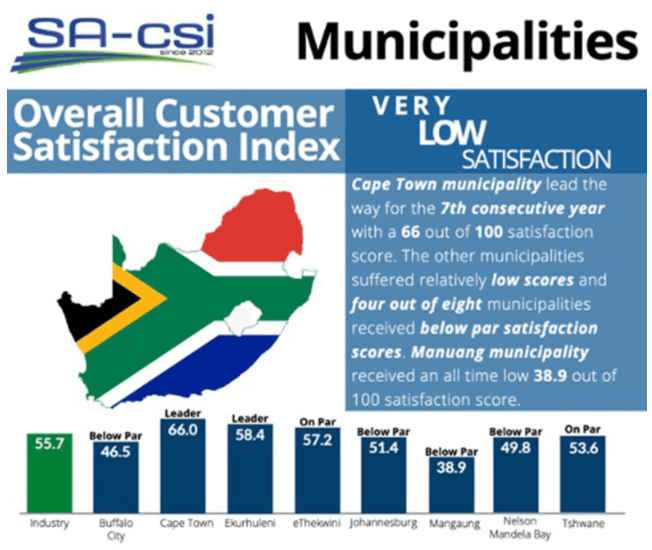Consulta has published its latest South African Citizen Satisfaction Index (SA-csi), showing what the average person thinks of their local metropolitan municipality.
The survey measures the Citizen Satisfaction and Trust in service delivery in eight category-A municipalities (metropolitan municipalities) as a snapshot, including: Buffalo City, Cape Town, Ekurhuleni, eThekwini, Johannesburg, Mangaung, Nelson Mandela Bay and Tshwane.
The total sample size was 2,427 random interviewees across the metros. Samples are representative of the general population of metros to ensure the robustness of the survey.
Of the eight metros polled, Cape Town was once again named as the best performing metro on the overall Citizen Satisfaction for ‘Large Metros’ recording the highest score for the seventh consecutive year.
Cape Town recorded a score of 66.0 out of a possible 100 in the latest index – a two-point improvement on its previous score of 64.1 in 2019. It is also more than 10-points above the par score of 55.7 for all municipalities and well ahead of all other metros.
Ekurhuleni follows with a score of 58.4 and an improvement of 1.7 on its previous score. Ethekwini and Tshwane are on par with scores of 57.2 and 53.6 respectively, while City of Johannesburg (51.4), Nelson Mandela Bay (49.8), Buffalo City (46.5) and Mangaung (38.9) come in below par.
The data shows that Nelson Mandela Bay has seen a sharp and steady decline in citizen satisfaction scores since 2018 when it reached a high of 61.9.
Mangaung’s scores declined to the lowest scores recorded on the index in South Africa, as well as any of the indices in the 23 international markets where the model is utilised.

Expectations vs reality
Consulta said that there is a notable gap between citizen expectations and perceived quality continues to widen, which means that while citizen expectations are increasing, actual delivery and service quality are declining.
Cape Town has the smallest gap (-5.5) between what citizens expect and what they perceive in terms of actual delivery, which means that Cape Town is closest to delivering the basic services of a local government to what their citizens would expect.
All other metros’ scores reflect substantial lapses between expectations and actual perceived quality of service delivery, with Buffalo City (-20,5) and Mangaung (-26.1) performing very poorly on this metric.
“Overall, the results show that citizens’ expectations of local government delivery of services are very far from being met with a particular concern around the trend in the widening of the gap of expectations to quality,” said Ineke Prinsloo, head of Customer Insights at Consulta.
A major contributor to the below par performance is the negative perception of reliability of services, she said.
“While metropolitan municipalities conduct living standards and lifestyle surveys to assist them plan out their services better, the results of the index points to a greater need to utilise and optimise the data and research to ensure that skills and services are accurately planned and consistently delivered.”

The latest report by South Africa’s Auditor General, Kimi Makwetu on shows that over a three-year period, R4.27 billion of local government expenditure was fruitless and wasteful.
In total, 91% of the municipalities did not comply with legislation. Makwetu added the lapse in oversight and lack of controls relating to compliance were evident in a number of areas, including supply chain management, adding that compliance with supply chain management legislation had regressed over the past few years, with only 2% of municipalities fully complying.
Only 20 municipalities received clean audits, and 13 of them were in the Western Cape. In Gauteng, it was the Midvaal local municipality.
The AG emphasised that Gauteng and Western Cape were the only two provinces that had made progress in looking after their finances and provision of services. Prinsloo said that Consulta’s data largely aligns with these findings.
“The results support the extent of the challenges faced by municipalities as highlighted in the AG report, with the low citizen satisfaction scores reported in SA-csi supporting evidence that there is a lack of appropriate financial and management skills, low level of cooperation in local government, failure to fill key personnel positions as well as a lack of political will to ensure accountability and proper service delivery,” she said.
“The consequences of the current status quo is reflected in the low scores achieved in the index pointing to a number of A-category municipalities that are unable to deliver to the satisfaction of their citizens on the very basic services such as clean water, sanitation, electricity and maintenance – the very core of their mandate.”


